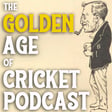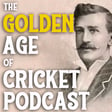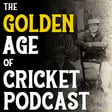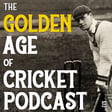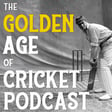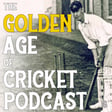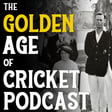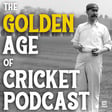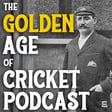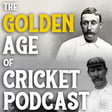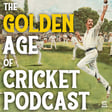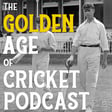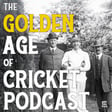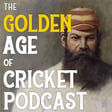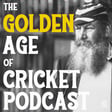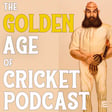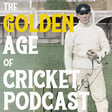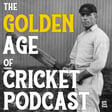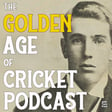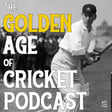Golden Era for Batters: Myth or Reality?
00:00:08
Speaker
Tim, there was a particular line in your book which jumped out at me, and I'll just quote it here. You say, It is remembered largely as a golden age for batters, yet it ranks among the worst periods in test history for batting.
00:00:21
Speaker
Can you explain what you meant by this, please? Well, just from it a numerical point point of view, and you know since 1910s, we haven't had a decade where bats have averaged so so little since.
00:00:34
Speaker
um So in that sense, you the the average is 23-24 in this era. um you know Average drummer runs per wicket.
1900s Batting Challenges & Scoring Analysis
00:00:40
Speaker
So it is a hard era for batting. But of course, it's an easy era than what happened before. So until 1893, the total average in test cricket was 18. This is a treacherous, treacherous era for batting.
00:00:51
Speaker
And the other thing is that batters actually do score very quickly can compared to both before and after. So and I think in the nineteen hundreds the scoring rate is 2.7 per six balls.
00:01:03
Speaker
Obviously, we have to do it in that way because the number of balls in over varies between ah different countries. and But that's the first, the fast in the first 10 decades of Test cricket. and So it's sort of...
00:01:15
Speaker
it is a golden age for batting compared to what's before and from a scoring rate compared to what happens after. But it's it's nothing like... The the golden age for batting from a purely numerical point of view would be the 1930s where getting absolutely industrial, you know, people scoring runs in industrial amounts.
00:01:32
Speaker
um but that But this essentially kind of... It also explains the allure because... There's something somehow it's more because it's still a relatively of low scoring era. So again, we talk about the Hobbs quote and the 70s. So actually, you can kind of, as a spectator, you think about it.
Spectator Experience & Memorable Innings
00:01:47
Speaker
If you if you see it a 70, you can kind of feel like you remember every shot of that. And if you see some, you know, Bradman school,
00:01:53
Speaker
150 or one of his double centuries it all at a certain point it probably does sort of fade into fade in so that there was a kind of scarcity value um to these great innings which actually someone might have played you know two or three great great drives in innings and then people would be you know write 800 words about their driving so it's actually it's quite a small number that they've actually played I think that feeds in as well and also but first all Also, a spectator experience was something I was thinking about that was really interesting. and Because, of course, as a spectator, you don't, you know, we obviously go on about ah overrates everything nowadays. But as a but spectator, you you are.
00:02:28
Speaker
That's not really how you consume a game. So you you consume a game in terms of time, basically. this's How long does a day take? And I think one of the the most revealing stats I found, which I think does help to to bring the legend ah to life, is Victor Trumper.
00:02:43
Speaker
he scores faster per hour than any man in test history. and I think that is really so important because, so his strike, we think about 67, which is still very, very quick actually. But as it you know, when you're going out to a game, you don't think, oh, he, you know, there was that, you know, that little flowur period where he didn't score runs 10 minutes ago. and you think, actually, oh my God, it's been two, three hours and he scored 100.
00:03:07
Speaker
um And I think that is the legend of Trump. And actually, you can see you can see why. So yeah he's the first man ever to score 100 before lunch, ultra-affirmed 1902. And that's certainly ever been done six times in Test cricket. So it is an incredible, incredible feat.
00:03:20
Speaker
And I think the kind of the visual experience watching Trump, scoring at 40 an hour, that is, he's rattling along. It's interesting to contemplate Trumper. I mean, why was he and scoring so
Flexible Batting Orders: Then vs Now
00:03:34
Speaker
fast? Because you could argue that when he played test cricket in England, it was a three-day test.
00:03:40
Speaker
But then again, on the flip side, when he was in Australia, there were timeless tests. so maybe it was just inherent in the way that he scored. I'm reminded of that quote from Cardus. Again, Cardus, most things come back to Cardus in the golden age, but how Trumper was the greatest batsman of all time, but Brabham was the greatest run scorer of all time.
00:04:01
Speaker
So there's a difference in terminology when we're talking about batsmen of this era. Yeah, one of the aspects, you're looking back, that I found so interesting is how flexible the batting orders are.
00:04:12
Speaker
So we think of Chumba as this great opener, and he kind of is that, but he think he gets 400s are in the the middle order. He's got an incredible record batting at number five. you know And actually, the batting orders are much more flexible, which...
00:04:24
Speaker
I wonder that feeds it. That's interesting as well, because as ah as a fan, you might be like, oh, that was a day when Trumper was batting at five, or that's when he was opening. So it a bit of if things were a bit more fluid. And and maybe from from day to day, there was a bit of a sense of you weren't quite as sure of the kind of broad outlines of what what you you were going to get.
00:04:40
Speaker
Actually, I think that's one area that cricket could learn from the goal. I think battling orders should be a bit more fluid than they are nowadays. Well, absolutely. But I think the main reason, and this is a segue to the next question, in that era, it's largely due to the state of the pitches.
Rain and Reversed Batting Orders
00:04:56
Speaker
let's talk about pitches in the golden age. I think the fluidity in the batting order was due rain affected pitches. And they would drop Trumper, for example, down the batting order so the wicket would have time to drive.
00:05:10
Speaker
But I'm glad you brought this up because i love looking at a rejigged batting order from the golden age of cricket because you can open a scorecard from 1905, for example,
00:05:23
Speaker
And you've got Trumper and Armstrong and Clem Hill suddenly batting in 9, 10, 11. And the modern eye would look at it and go, what is going on? But it's interesting. I think it's in it's i think it's in nineteen ah one o two Ashes in Australia, the fourth test match the fourth test match in Melbourne.
00:05:44
Speaker
And there is a sticky wicket and there's rain. Australia basically reverses their batting order. I think it's Reg Duff. in his test debut, who's normally an opener, he comes in at number 10 and he scores a century.
00:05:58
Speaker
And for like 50 years, he holds the record for the highest score for number 10, of course. um So the art of the reordered batting lineup is something I would love to study in more detail because...
00:06:14
Speaker
It's something that is a lost art now. But Tim, let's talk about pitches during the golden age and how that affected results, particularly batting, but also bowling during the golden age. Well, I suppose, yeah, there's a link to something else, which is the the length of test matches. It's just bizarre. You have timeless tests in Australia and each day testing is basically three days, unless it's the last set of a series when it might be timeless.
00:06:41
Speaker
So, and that, that feeds in as well to, if you want to score quickly, if you want to get result in England, you have to score, score quickly. Um, and we basically have, uh, much more, you the heavy roller,
00:06:52
Speaker
and it it grows and develops a lot better. So basically it smooths out some of the indentations in pitches and you can begin to trust to trustss the bounce a little bit more. I think that is one of the big things that's going
True Pitches & Test Cricket Evolution
00:07:05
Speaker
on. and So with pitches being being truer, the whole dynamics of test cricket changes um and you have the dynamic of of time, which I think certainly when people talk about the Golden Age, we said that's large coming from England and that's also these batsmen are scoring quickly ah and that all feeds into the the constraints of of the era.
00:07:23
Speaker
I don't know about you, but I would love just as an experiment to see a test match today played in an, on an uncovered pitch, just to see how the batsman would deal with the variety of bounce and where the,
00:07:40
Speaker
ball is cutting, also to see how the bowlers would cope because the bowlers of the golden age knew exactly what to do ah with a sticky wicket or a wet wicket.
00:07:51
Speaker
I'm sure Sydney Barnes, for example, made full use of a wet wicket. MUSIC PLAYS
00:08:00
Speaker
good love i like the light sun come in or the rain bar mc a
00:08:08
Speaker
and It's really interesting when we look at cricketers from this era, the Golden Age, writing later in the 1930s, which was the era of doped pitchers, and they project their ideas of ah the state of pitchers.
00:08:28
Speaker
And I know Clem Hill, for example, wrote for his local newspaper saying that all wicket covers should be burnt. Because it does give the batsmen too much advantage and too little from the bowlers.
00:08:41
Speaker
And this, I think, goes back to why the Golden Age is so beloved. Because it was a true balance between ball and bat. Something which is lost these days. I know a lot of cricket fans think that.
00:08:54
Speaker
It is too much in favour of the batsmen. And you could argue that T20 is designed just for batsmen. So it would be really interesting to see how cricketers would cope today on an uncovered pitch.
Swing Bowling Emergence & Rule Changes
00:09:07
Speaker
Now, as you discuss in your book, ah once these pitches did improve, and naturally it was in favour of batsmen, bowlers had to change their craft and become a bit creative and one result was the introduction of swing bowling could you elaborate on this please George Hurst um we think is one of the the kind of leading early experience of swing from around 1900 um and before ah this took me a long time to think ah try and get get to grips with it but before you had swerve uh swerve was dominant and there was periods when you had both but
00:09:43
Speaker
Swerve is basically is drift. um so you move So I think a lot of bowlers before were swerve bowlers at probably 60, 65 miles per hour. So almost like very fast spinners in kind of modern parlance. And then you have ah introduction of of swing, which is obviously the new ball is going to swing.
00:10:02
Speaker
And it's going to swing especially because you have this rule change in 1907 where you you get a second new ball after size reached 200. So nothing no no nothing linked to number of overs. So it's quite it's quite odd actually. So if you get to 200 quickly, you can actually kind of almost be punished for it because you get a second new new ball to pretend against as a batting side.
00:10:20
Speaker
um So yeah, you have you have swing become swing as well. So you can swing the ball but both ways and you have the swerve balls as well. um And you're you're getting balls that are becoming i think a little bit faster as well. Although this is a perennial debate.
00:10:35
Speaker
I think golden age, is probably the peak was probably early mid-ish 70s miles per hour. Although yeah we can't be be sure, for fish we can't be certain, obviously. suppose the downsides golden age from a tactical bowling point of view because to these these conditions are...
00:10:51
Speaker
They vary so much because of the the weather in the set pitches, which is
Golden Age Strategies & All-Rounders
00:10:55
Speaker
really interesting. But actually, you do get some bowling teams. The best way around is is to really play a holding game when it's easier to bat. bat Warwick Armstrong is is one of the leading exponents of this. So he but bowls a lot into the rough outside leg stump with fields on the the leg side. And and he's going out like one, one and a half and over.
00:11:13
Speaker
and and So there's some so some of it yeah some of the cricket, even in the golden age, it can be pretty turgid. and But think there's conditions. I mean, we all talk about conditions in cricket. I just think fundamentally they varied so much more then because of uncovered wickets.
00:11:27
Speaker
So it meant you have these these crazy batting orders and different tactics at different times. So actually, kind of tactically, it is it is a very interesting game. And, you know, we we all love the variety of of modern test cricket terms of the tactics. But actually, you just had more of that then and the idea that...
00:11:42
Speaker
almost kind of a heroic quality having a star batter kind of come out at number nine and rescue in innings and stuff. you know, some of these, he led himself to fantastic stories. And even but with with Jessup, the fact he's a specialist batsman at number seven normally is just kind of amazing. and it And it speaks to that era um and the kind of the style that was inherent in We forget today, I mean, we talk about Jessup, the batter, um batsman, but he was an all-rounder essentially.
00:12:12
Speaker
and they seemed incredible fielder by all accounts. Yes, yes. And he wrote a lot about the art of fielding, the art of bowling, the art of batting. But we forget just how many all-rounders...
00:12:24
Speaker
there were in the golden age. Stanley Jackson was an all-rounder. We think of him largely for his batting and Warwick Armstrong, of course. um And I'm glad you touched Warwick's leg theory there because I know there are some of my English ah listeners who like to remind me that three decades before Bodyline, it was in fact...
00:12:49
Speaker
uh warwick who introduced uh leg theory to test cricket even though it wasn't to such a bloody effect um but still uh tim let's talk about ah one of the uglier truths of test cricket during the golden age and that is racism Who, in particular, suffered from it during this period?
Racism's Impact on Player Selection
00:13:13
Speaker
And did it, in fact, extend beyond the individual? Was the absence of a coloured test nation during the Golden Age just a coincidence? No, I don't think it is. I think West Indies, you know, they have a total in 1906 and they're very strong. I think they've...
00:13:29
Speaker
They were certainly stronger than South Africa when South Africa had got test status earlier. South Africa, actually, in 1996, were a strong side. But West Indies have a strong claim to test status as well. You also have, obviously, it's not exactly, it's sort of a linked issue, which is just, you know, people want test cricket to be a British empire sport, which is the impact of Abe Bailey, one of the most important figures in test history, who creates the first ICC in 1909. He's Anglo-South African, you know, one of his children, one of Winston Churchill's children, so he is really
00:14:00
Speaker
embedded in the in the establishment. and But we see actually in pretty much a chilling kind of um foreshadowing of what happens with Bazdolivera and subsequently we have, we don't have a smoking gun but it's but they say but with Ranji he is not selected to tour South Africa in either 1898 or 1902 and you know through through through looking at ah documents and and readings and so on it it it basically feels like, it basically seems South Africa pressurising not to pickt pick Ranji for those tours. So you do have, you know, you have racism impacting who players are basically allowed to pick. And in fact, even a Ranji, he only has to wait till the second test in 1896 to make his debut. that's at Old Trafford. He's not picked at Lords in the the first one. um
00:14:43
Speaker
And that's because um each ground hosting has a, has a say in selection basically. And he's picked Old Trafford and he clearly is brilliant and should have been picked earlier. So yeah, there's a very uncomfortable element, element to this as well.
00:14:57
Speaker
Um, Jack Marsh, ah yeah aboriginal leading Aboriginal bowlers, um who whose careers are are undermined by the racist structures of of the time um and arguably could have paid for Australia.
00:15:10
Speaker
So, there yeah, there's a very, very uncomfortable element here. Absolutely. mean, South Africa only, yeah, only play until 1992. They only play against one player who's not of white skin, and that is...
00:15:24
Speaker
Dilip, who is Ranji's nephew, who plays against Africa once in 1929, but again is is not picked against Africa subsequently and it's his past goal and age when when he you should have been on Naret.
00:15:36
Speaker
um So yeah, it it is an exclusionary era in in many ways and I suppose it's a It's an arch-arch establishment era, which which goes back to the batsman we all talk about and revere, but who ran the game and everything.
00:15:50
Speaker
Amta captains everything. So it it's a pretty exclusionary era in a lot of different ways. um Yeah, so people who are nostalgic for the golden age, they're also nostalgic for a certain...
00:16:02
Speaker
worldview and a kind of way way of being and that feeds in, you know, so as they felt on top of the world and and that they literally and then they were because they they they ran things how they wanted and I got about how they wanted and and everything. and got They got to captain all these things together.
00:16:15
Speaker
And I think when we consider the Golden Age, it's important to consider it warts and all. and And I think your book does a great job in highlighting those less savoury aspects of the era.
00:16:28
Speaker
I certainly know from an Australian perspective that the Jack Marsh issue still is a topic today amongst historians. and And whether he actually justified a spot...
00:16:42
Speaker
or whether it was, I mean, it was of its time, but, you know, we we look at it today and it is blatant racism because of his skin. And whisper love's old story back i all there is so and with love flow When the summer days are gone.
00:17:24
Speaker
Now, Tim, the the title of your chapter dedicated to the Golden Age, you ponder the question of whether it was a missed opportunity.
Missed Expansion Opportunities for Test Cricket
00:17:35
Speaker
What opportunity did it miss and how? Well, the huge missed opportunity was to grow Test cricket beyond three three nations. And that was a chance to actually welcome Argentina and USA as as Test nations. We've talked about how the early history of Test status and what were Test matches was so arbitrary. you know I've looked at these matches and the quality of England slash Australia teams who were playing US s and Argentina, and and they are fantastic. far, far superior to the quality of certainly early in English teams played South Africa um and the yeah in in the golden age. um
00:18:10
Speaker
So they they have more claim to test status than quite a lot of matches that do have test status. We then obviously fast forward to 1930, England literally playing two test matches at the same time. So by definition, they can't be England's best 11 players, right?
00:18:23
Speaker
and so So there there is... Yeah, there was a real chance there to welcome and it. It would have been such a different sport to have us in the US as Test Nations. It would change the whole fabric. You probably would have got Canada.
00:18:36
Speaker
Scrap cricket has pretty strong history in Canada. You'd have probably got Canada fairly soon afterwards. Argentina have been a gateway for South America, who knows? But even if that doesn't happen, you probably get, I think you can be pretty sure you get three other test nations, Argentina, US, and you have Canada follow soon.
00:18:51
Speaker
And then we have the three that that do come in the 1920s. It suddenly means by 1930, we have nine test nations. and And it's actually, it feels like quite a global sport. rather than a pretty parochial game it it was.
00:19:04
Speaker
um And of course, so until, yeah, I think until 1948, three quarters of all test matches involved England one of the sides. So you really have test cricket. That's why I say test cricket, modern test cricket doesn't really begin until 1950 because until then it's almost ah series of bilateral engagements with England in the middle.
00:19:20
Speaker
um Only after that do we get rivalries to develop that don't really involve England. um And actually, yeah, so have have we if we had US s and Argentina, that would have changed the whole whole dynamics and it would have,
00:19:31
Speaker
And also just in terms of the way that sport was run, you know, one of the the damaging things about how cricket has been was run was England, Australia had the veto at the ICC until 1993. I think if you get US nitrogen involved in that, it's just not sustainable. That doesn't happen.
00:19:45
Speaker
so And that in itself, that probably... lends itself to cricket being more outward looking earlier so maybe the world cup formed uh 1975 maybe you know revenues divided more equally around the world so i think so many things could have happened so i think there is a there is a real tinge of silence because if you look at those yeah yeah u.s teams touring england argentine side playing mcc both before and after the gone they did actually yeah they they could have been destinations and it you know we would have had a more vibrant game we'd have had innovations that we hadn't heard of. We'd probably have a ah Barty King trophy between the US us s and England. like it It would have been fantastic. And actually, was ah it was the uber uber establishment figures at the time that stopped that from happening. So yeah, that there was a sound I suppose. And was like, this actually could have, you know what happened was not inevitable. you We really could have had a more more global
00:20:35
Speaker
global game of test cricket, which would have been fantastic. And it was it was cricket liberally excluding. It was not it was not other countries. you know what seemed to be goingnna It was cricket deliberately took a decision to to exclude them. And and of course, this is going well beyond the golden age. but this the incredible you know hypocrisy, irony, that South Africa are the ones who create the rule in 1909 that you have to be part of the empire to be a test nation.
00:21:01
Speaker
and then And then it becomes, you have to be part of the Commonwealth. And then in 1960, South Africa are thrown out the Commonwealth because of apartheid, which means by their own rules, they helped create, they should be ineligible to play test cricket.
00:21:13
Speaker
But Australia, England and New Zealand just ignore these rules and carry on playing South Africa for another 10 years to come. I love that you touched on, i mean, certainly the golden age, everyone just wanted to play England.
00:21:24
Speaker
um Certainly for pride, but but perhaps more importantly for gate receipts as well. There's talk of when South Africa want to come to Australia, the Australians are like, why? We're not going to make any money. And then, of course, it's the same ah when they're rolling into the 1912 tournament there's a lot of objection because who's going to want to watch south africa versus australia in england i'm having said this having just watched the uh world championship final which uh was very well attended in at lords um but yeah so much during this golden age comes down to a couple of things
00:22:05
Speaker
one being money and how much they could make, but also the imperial nature of cricket and how they developed that. um And so, Tim... and yeah just as Yeah, I suppose the hypothetical there, actually, the Tri-Series, you know, what if the Imperial Cricket Council had actually been a Global Cricket Council? Maybe the Tri-Series in 1912 would have been a five five nations competition with the USA and Argentina. And then we get in the world, we have a test World Cup, then maybe that that's set up. So, yeah, so many things are possible.
00:22:34
Speaker
Yeah, I think an alternate history of test cricket needs to be written and and where cricket would have gone ah had america embraced ah had America embraced cricket would have been something incredible to consider.
Golden Age: Mesmerizing Yet Flawed
00:22:50
Speaker
um Tim, as we near the conclusion of this podcast and as we've heard all of your thoughts, which has been fascinating, one question remains, and it is a tough one,
00:23:02
Speaker
But in your mind, do you think it really was a golden age of cricket? And if not, should it be renamed? yeah I'm going to try and have a cop out of an answer, which is, you know, ah right I think it's a golden age and a missed opportunity and it should be be seen as both.
00:23:19
Speaker
um And because some of the cricket in the era is incredible, like we can't detract from that. And um I really get a deeper appreciation of that, but I also got a much deeper frustration of the missed opportunities and and all the kind of injustices of the era as well. So I think, yeah, it can two things can be pre mutual true at the same time. um So yeah, I'm not sure if that that's a cop out, but it was a fantastic, you know, many ways of,
00:23:40
Speaker
absolutely mesmerizing era of a cricket on um on the pitch and does help to shape the game for century or or more to come but it also there were a lot of missed opportunities where we could have had you know cricket could have been far more advanced in it than it is now as well so I'm not sure if that's a cop-out though It's not a cop out. It's a tough question. I'm not sure how I would answer it. So thank you for at least attempting it. And thank you very much for being a guest on today's podcast.
00:24:06
Speaker
It's been great to get your insights. And i applaud you again for your book, which was only published this year, a Test Cricket, A History. a fabulous read.
00:24:16
Speaker
Go out and get a copy if they haven't already. I'm seeing some great reviews online from right around the world. So congratulations on the book and thank you very much for being my guest today. Thanks so much, Tom. Really, really enjoyed it.
00:24:30
Speaker
That's all for this episode. Be sure to like or favorite the podcast to make sure you never miss an episode. My name is Tom Ford and until next time, it's bye for now.

